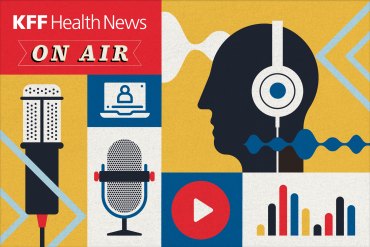Amid Confusion Over US Vaccine Recommendations, States Try To ‘Restore Trust’
The decisions by the Advisory Committee on Immunization Practices matter, because insurers and federal programs rely on them, but they are not binding. States can follow the recommendations, or not.
States Are Cutting Medicaid Provider Payments Long Before Trump Cuts Hit
North Carolina and Idaho are cutting their Medicaid programs to bridge budget gaps, raising fears that providers will stop taking patients and that hospitals will close even before the brunt of a new federal tax-and-budget law takes effect.
Journalists Follow the Fallout of CDC Director’s Firing and Trump’s Health Policies
KFF Health News journalists made the rounds on national and local media recently to discuss topical stories. Here’s a collection of their appearances.
Mercury in Your Hot Dog? Vaccine Skeptics Face Their Limits at Crucial CDC Meeting
A Centers for Disease Control and Prevention meeting on vaccines pitted scientific expertise against vaccine skepticism. An often confusing debate ended with critics of the current vaccine schedule tabling a vote to remove one of its cornerstones.
Exactech Will Pay $8M To Settle Lawsuits Over Defective Knee Implant Parts
Whistleblower lawsuits alleged that Exactech covered up defects in knee implants while patient injuries mounted.
Kennedy’s Take on Vaccine Science Fractures Cohesive National Public Health Strategies
A lack of faith in the soundness of the Centers for Disease Control and Prevention’s new direction has led states to explore enacting their own vaccine policies. A patchwork of divergent recommendations and requirements could result.
Projected Surge in Uninsured Will Strain Local Health Systems
In South Texas’ Rio Grande Valley, many people go without health insurance, and the health system struggles as a result. Similar communities dot the nation, and more could face such difficulties under President Donald Trump’s tax-and-spending law.
Team Trump’s Answer to Ballooning Obamacare Premiums: Less Generous Coverage
Tens of millions of people face sticker shock enrolling in Affordable Care Act insurance for 2026. To save money, the Trump administration wants them to consider less generous coverage.
Parents Fear Losing Disability Protections as Trump Slashes Civil Rights Office
The Education Department’s civil rights office often intervenes when students face discrimination based on race, sex, religion, or disability and their families can’t resolve complaints locally. Parents fear the effort to gut the federal agency will leave them with nowhere to seek justice.
Trump’s Medicaid Cuts Were Aimed at ‘Able-Bodied Adults.’ Hospitals Say Kids Will Be Hurt.
The GOP said its overhaul of Medicaid was aimed at reducing fraud and getting more adult beneficiaries to work. Among the likely side effects: fewer services and doctors for treating sick children.
Lice Pose No Health Threat, Yet Some Parents Push Back on Rules To Allow Affected Kids in Class
Public health officials see lice as a nuisance, not a health threat, and the Centers for Disease Control and Prevention has recommended for years that students with live lice be allowed to remain in class. But as “no-nit” policies have been dropped in favor of “nonexclusion” rules, some school districts have seen parents and teachers push back.
In the Fallout From Trump’s Health Funding Cuts, States Face Tough Budget Decisions
The Trump administration has pushed a significant amount of health costs to states, whose budgets may already be strained by declining state tax revenues, a slowdown in pandemic spending, and economic uncertainty. State and local governments now face difficult decisions.
Researchers Shift Tactics To Tackle Extremism as Public Health Threat
As extremism and radicalization worsen in the United States, a group of researchers is trying out a new approach that addresses the issue as a public health problem.
In a survey by the National Funeral Directors Association, more than 60% of respondents said they would be interested in exploring green and natural burial alternatives.
Fighting a Health Insurance Denial? Here Are 7 Tips To Help
Many people don’t know they can fight a health insurance denial, let alone how to do it. Here are practical tips for consumers who want to appeal a prior authorization decision.
As Insurers Struggle With GLP-1 Drug Costs, Some Seek To Wean Patients Off
Conventional wisdom says GLP-1 drugs must be taken indefinitely to maintain weight loss. But a growing number of researchers, payers, and providers are challenging that consensus and exploring whether — and how — to taper patients off expensive GLP-1 drugs.
Do Pediatricians Recommend Vaccines To Make a Profit? There’s Not Much Money in It
Four pediatricians said evidence-based science and medicine and a desire to keep kids healthy drive doctors’ childhood vaccination recommendations. And while pediatric practices might make money immunizing privately insured children, most practices likely break even or lose money from providing the shots.
Social Security Praises Its New Chatbot. Ex-Officials Say It Was Tested but Shelved Under Biden.
Social Security, under the leadership of a tech enthusiast, rolled out an artificial intelligence-powered chatbot to answer calls. But as beneficiaries complain about glitches, lawmakers and former officials ask whether it’s a preview of a less human agency at which rushed-out AI takes the place of pushed-out government workers.
Blue States That Sued Kept Most CDC Grants, While Red States Feel Brunt of Trump Clawbacks
The Trump administration’s cuts of public health funds to state and local health departments had vastly uneven effects depending on the political leanings of where someone lives, a new KFF Health News analysis shows.
FTC Has Long Said Products Must Back Up Health Claims. A MAHA Lawsuit Would Upend That.
Xlear, a maker of xylitol gum, has sued the Federal Trade Commission, saying the onus should be on government to prove that ingredients don’t live up to advertised claims. RFK Jr.’s “medical freedom” allies have rallied to the cause.



























